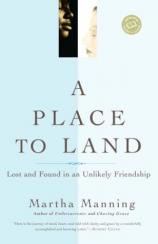Reading Group Guide
Discussion Questions
A Place to Land: Lost and Found in an Unlikely Friendship

1. Early in the book, Manning writes that "there are perhaps only two things that generate profit from the currency of suffering --- the slow accumulation of wisdom and compassion." How does this statement form the theme of A Place to Land? In your opinion, what is the greatest piece of wisdom and compassion that Manning absorbs during the course of the book?
2. Manning writes this book in the present tense, as a series of vignettes. How does this constitute an effective narrative technique? What other devices does she use to engage the reader? Does this read like an "accidental" memoir, as Manning characterizes her previous work? Why or why not?
3. What effect does Manning's early disclosure about her depression have on the memoir? How does her characterization of her struggle against the illness as "coming into the light" mirror Deven's struggle against his cancer? How are their fights similar and different?
4. "I puff up at the prospect of my own goodness," Manning writes of her original foray into volunteerism. Does this initial attitude carry over into her original interaction with Raina and her family? How does her attitude change as the book unfolds, and her involvement with Raina and her family grows?
5. What aspects of Manning's personality are fulfilled by her life as a writer and as a psychologist? How does she become a more fully formed individual by forming a relationship with Raina and her children?
6. Besides the common thread of motherhood, what personality traits and experiences do Manning and Raina have in common? What do you think is the greatest stumbling block to their relationship? How does Manning change under Raina's influence, and vice versa?
7. Manning speaks of the "different expectations" that she and Raina have going through life. How does Raina's attitude change as her relationship with Manning grows deeper? Does Manning's sense of her "Great Entitlement" transform as well?
8. Discuss the depiction of men in the novel. How does the characterization of Bruce, Manning's husband, compare to that of the men that Raina is involved with? In which ways does each woman need outside support? How are they self-sufficient?
9. How do Manning and her husband influence the lives of Jade, Deven, and Darren? How do the children adjust to having them in their lives?
10. Why do you think that Manning connects first with Jade, and then with the twins? In which ways does Jade represent the "little girl" dreams that Manning misses with Keara gone? How are Keara and Jade similar and different?
11. What far-reaching social issues does Manning grapple with on a personal basis by virtue of her involvement with Raina and her family? How does the issue of race affect their relationship? How do economic issues play a role?
12. How do the children react to Bruce and Manning being a different race? Conversely, how do Bruce and Manning react to being "figured out" by the outside world? Is this damaging to their relationship?
13. The diagnosis of Deven's cancer is devastating to the entire family. How does each of them grapple with it, in a different way? How does the illness bring Manning closer to him, and how does it drive her further away?
14. Why do you think Deven likes The Wind in the Willows so much? What does the concept of "home" mean to him, and how does that concept change as he grows more sickly? How does the prospect of getting a home galvanize Raina? How does it represent a symbol to her, and to Manning?
15. The theme of spirituality threads throughout the book. How does faith guide Manning, and how does her religion differ from that of Raina? In which ways does this difference represent a crossroads in their relationship?
16. How does the tone of Manning's memories change after the events of Deven's death and September 11th? How does she combat her depression?
17. Why does Manning end the book at the one-year anniversary of Deven's death? Does this choice in any way reflect the book's title, A Place to Land?
18. "I think we're okay," says Darren at the book's conclusion. Do you agree with his assessment? Why do he and Jade turn to Bruce and Manning immediately after Deven's death? How is this significant?
19. The subtitle of the book is Lost and Found in an Unlikely Friendship. What has each woman lost and found within the course of the book?
A Place to Land: Lost and Found in an Unlikely Friendship
- Publication Date: June 29, 2004
- Paperback: 272 pages
- Publisher: Ballantine Books
- ISBN-10: 0345450574
- ISBN-13: 9780345450579






